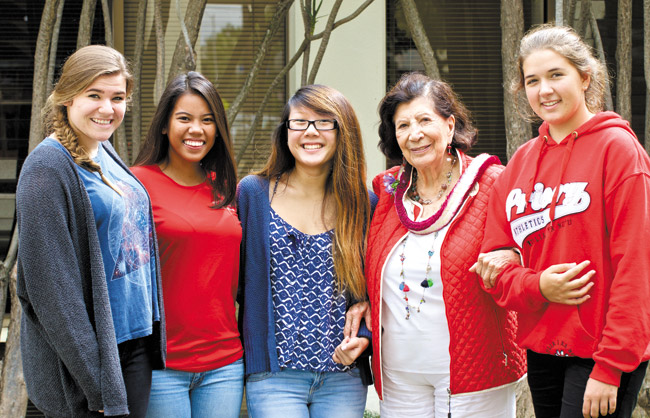Sharing Lessons From A Life Of Service

Guadalupe Rivera with Priory students (from left) Madeleine Sherman, Gabrielle Beniga, Su Jung Maerki and Constanza Mara Rico-Avella Loncan JADE MOON PHOTO
Guadalupe Rivera has dined with presidents and Rockefellers and royalty. Her father was Diego Rivera, a world-renowned muralist. She made her mark in Mexico as a congresswoman, a senator and a governor at a time when women were not exactly welcomed with open arms into the world of political movers and shakers.
And yet Guadalupe Rivera y Marin — a child of privilege and a woman of Mexico’s upper class — devoted her life to the powerless and the poor, and to the struggles of the most downtrodden social class of all: women.
I sat at a table with the 90-year-old Rivera at St. Andrew’s Priory School for Girls, where she’d spent the morning sharing her wisdom and experiences with students. She was small and frail, but her mind was sharper than mine, and her eyes shone with humor and passion. She spoke English well, although a couple of times we had to rely on translation help from her friend, Mexico Honorary Consul Andrew Kluger. It was Kluger who brought her to Hawaii.
What, I asked, did the girls want to know about you?
“They want to know, why I am the way I am,” Rivera laughed.
“When I was a child I realized the difference between social classes in Mexico. And I saw how the people suffered and how they are exploited. For instance, I went to a church with my family, and I saw a very, very poor woman. An Indian woman. She took out of her pocket 25 cents in silver — a silver coin. And she gave it to the church. My god, she was wearing only rags! And then I told my aunt, ‘Tia, how can they take their money away? They are so poor!’ And my Tia said, ‘We better leave the church because the devil is giving you these ideas.'”
Rivera was just 8 years old when she had this profound realization.
“I realized that my world was the same. The women who worked at home were poor, the women who worked for my family. The woman who washed our clothes, she was a poor woman. The poor people were always exploited by the other people.”
And that, she says, is why she went into politics.
“When I was growing up, I heard my father talk about politics. My father took me with his friends to the Communist Party. I never became a communist, but I heard how they talk. I grew up with this in my life.
“I always thought that in my adult life I should work to change the situation in my country.”
And she did. Rivera became a Congresswoman, and then a senator and a governor of the districts in which she lived in Mexico City.
She worked tirelessly to improve the lives of women. When she went out into her districts to talk to the people, she noticed how the women were making tortillas, by hand, one at a time. They would make a dozen and sell them for a peso. Rivera procured machines that could turn out tortillas en mass, allowing the women to make hundreds at a time, which they could then sell to restaurants and stores. It was unheard of at the time and did not make her popular with the men.
According to Kluger, Rivera set up institutes. She called them “the Las Marias, the Marys. These were women who were beggars, or working the streets selling little hand-made trinkets, but they really didn’t make money.”
Rivera organized them.
Kluger said, “She and another woman got together and built these schools in Mexico City and taught them how to read and write. And what ended up happening is she got literally hundreds of women off the streets, educated them. And then she said, you know, I don’t want them selling on the street again.
“And they formed a cooperative. All the things they were making, she sold them to stores for tourists. And the money went back to the women.”
The impact Rivera has had in her own country resonates around the world. And remarkably, politics wasn’t her only passion. She’s written 10 books, is about to finish a new one and is already planning for the one after that.
Kluger brought her to Hawaii because he thought students here could benefit from seeing a woman who has accomplished so much, and is still going strong.
Rivera always is very happy to share. She believes young women have the potential to save the world.
“The world will change if women have more power,” she says. “Because women, we have a different point of view. I think women in power are more honest than men in power. They do these things because they really want to change things. The men don’t care about women and children and education. The women do. They’re not looking to get more money.”
Her advice to the girls of Priory: “You have to work a lot to get your degree at university. You have to cultivate yourself at the same time. And you have to know what happens in your community in which you live.
“Always speak the truth. Because if you tell the truth, nobody can say anything bad about you. And if you tell the truth, the people who hear you will think that you are a strong person.”
Rivera, who has worked all her life, may be the strongest woman I have met. And one of the most inspiring.
“I think the most important thing,” Rivera said, “is that someone fought in life and succeeded and did something useful.”
jmoonjones@yahoo.com





